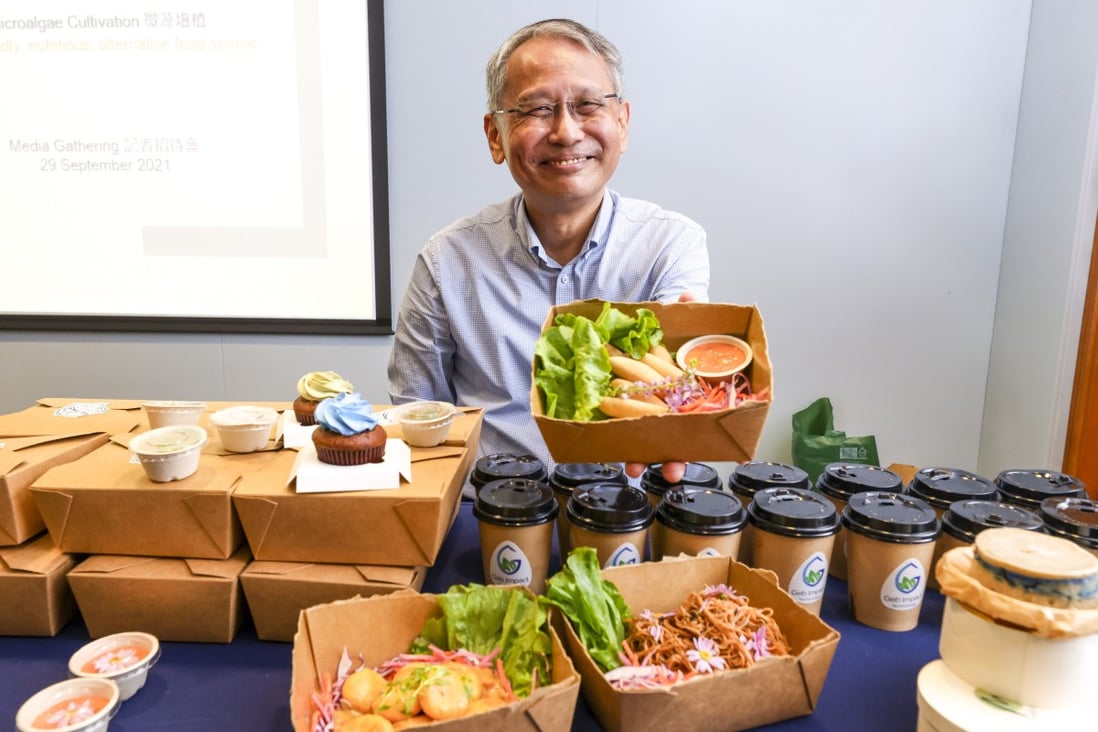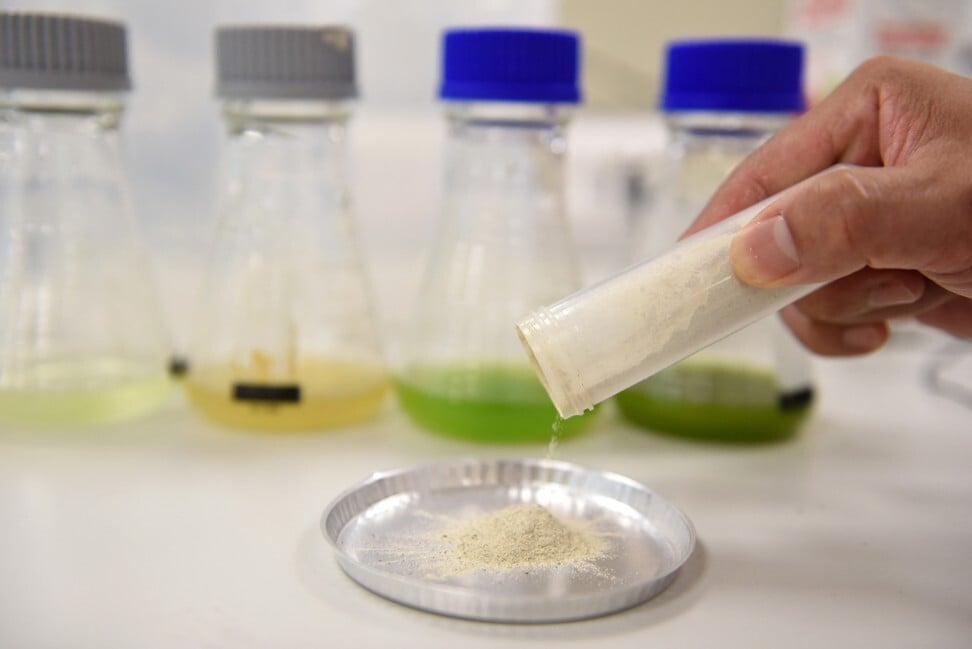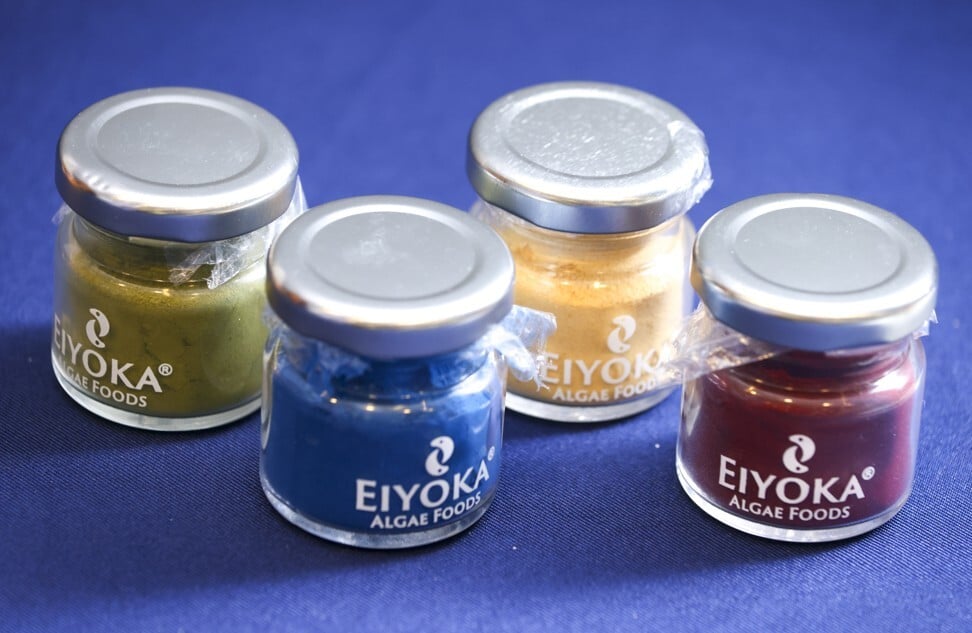Geb Impact is conducting pilot production of microalgae with its proprietary technology, with plans to ramp up output to one metric tonne per month
The Hong Kong Innovation and Technology Fund has funded half of the start-up’s HK$2 million (US$257,000) project to scale up microalgae cultivation
Martin Choi
+ FOLLOW
Published: 4:00pm, 3 Oct, 2021

James Chang, founder and chief executive of Geb Impact Technology, displays food products made with ingredients from microalgae protein produced by the Hong Kong biotech start-up.
Photo: Dickson Lee
Hong Kong biotech start-up Geb Impact Technology is eyeing the rapidly growing plant-based food market as a sustainable supplier of microalgae-based protein to food manufacturers.
As leading plant-based food producers, such as Beyond Meat and Impossible Foods, continue to benefit from increasing consumer demand, Geb Impact sees an opportunity to supply the sustainable ingredient made from microalgae.
“We are able to produce that protein sustainably, so if we become the supplier [for food manufacturers] in terms of that protein, there is no limit to how much they can produce,” said James Chang, founder and chief executive of Geb Impact.
Microalgae are single-cell microorganisms found in fresh and salt water that grow through photosynthesis, consuming carbon dioxide and producing oxygen. As microalgae do not compete for natural resources or farmland, they are considered one of the most promising sustainable sources of food ingredients.
Hong Kong biotech start-up Geb Impact Technology is eyeing the rapidly growing plant-based food market as a sustainable supplier of microalgae-based protein to food manufacturers.
As leading plant-based food producers, such as Beyond Meat and Impossible Foods, continue to benefit from increasing consumer demand, Geb Impact sees an opportunity to supply the sustainable ingredient made from microalgae.
“We are able to produce that protein sustainably, so if we become the supplier [for food manufacturers] in terms of that protein, there is no limit to how much they can produce,” said James Chang, founder and chief executive of Geb Impact.
Microalgae are single-cell microorganisms found in fresh and salt water that grow through photosynthesis, consuming carbon dioxide and producing oxygen. As microalgae do not compete for natural resources or farmland, they are considered one of the most promising sustainable sources of food ingredients.

Protein powder made from microalgae is poured into a dish at a research laboratory in Singapore. Microalgae are considered one of the most promising sustainable sources of food ingredients. Photo: AFP
Chang said microalgae can yield the equivalent of 30 to 50 metric tonnes per hectare, about 15 times more than soybeans, noting that this can go some way in alleviating the hunger crisis currently gripping the world. A United Nations report in July showed that there was a dramatic worsening in world hunger in 2020 caused by the pandemic, with nearly one in three people without access to adequate food.
The global plant-based food market is expected to reach US$74.2 billion by 2027, growing at a compound annual growth rate (CAGR) of 11.9 per cent from 2020 to 2027, according to a report by market intelligence provider Meticulous Research in September 2020.
“The pandemic has led to some best practice models for the plant-based products industry as the coronavirus epidemic has conveyed to the forefront the connection between public health and animal meat consumption, which provides consumers a ground to go for a plant-based diet,” Meticulous Research analysts wrote. “From a manufacturing and distributing point of view, this industry has faced unprecedented demand from manufacturers as well as consumers.”
“This is a potential disruptive product for the plant-based alternative protein [market], because of the high proliferation rate,” said Chang, noting that cost will come down as production is scaled up. “We are very confident that it can be a sustainable food source without having to become a victim of climate change or limited resources.”
Founded in 2013, Geb Impact is currently conducting pilot production of microalgae with its proprietary technology at their 13,000 sq ft facility in Sheung Shui. Their product: a freeze-dried microalgae powder containing dietary proteins, lipids and vitamins can be used as an ingredient in different food products.

Geb Impact has launched Eiyoka Algae Foods to showcase proof-of-concept products incorporating microalgae.
Photo: Dickson Lee
The company aims to produce one metric tonne of microalgae powder per month and has partnered with Sweet Secrets, a health-conscious bakery, to create plant-based cupcakes with microalgae frosting. It also has a tie-up with plant-based culinary nutrition platform Our Conscious Kitchen to create an antioxidant spice blend.
The company hopes to partner with more restaurants, bakeries and chefs to bring microalgae-based food products to more consumers in Hong Kong, before expanding into China and the rest of south Asia, where there is a growing vegan market, said Chang.
Geb Impact has also launched Eiyoka Algae Foods to showcase proof-of-concept products incorporating microalgae, such as their shrimp roe noodles which can be bought online.
The start-up has received a grant from the Hong Kong Innovation and Technology Fund under the government’s Enterprise Support Scheme, funding half of their HK$2 million (US$257,000) project to scale up microalgae cultivation.
Impact investment firm Dao Foods International has also invested in Geb Impact to further develop microalgae cultivation and help extend their product reach into China.
Singapore scientists make bandages out of durian husks
Geb Impact was also looking for series A investment over the next two years, to hire new professionals and buy more equipment to scale their production and increase capacity to reach industrial levels.
“Ingredient companies are better positioned in the current environment of greater social and environmental awareness from consumers,” Credit Suisse Research Institute wrote in a report in June.
“We anticipate that ingredient companies will gain a greater share of the value chain as they aid manufacturers in improving innovation and speed to market.”
The company aims to produce one metric tonne of microalgae powder per month and has partnered with Sweet Secrets, a health-conscious bakery, to create plant-based cupcakes with microalgae frosting. It also has a tie-up with plant-based culinary nutrition platform Our Conscious Kitchen to create an antioxidant spice blend.
The company hopes to partner with more restaurants, bakeries and chefs to bring microalgae-based food products to more consumers in Hong Kong, before expanding into China and the rest of south Asia, where there is a growing vegan market, said Chang.
Geb Impact has also launched Eiyoka Algae Foods to showcase proof-of-concept products incorporating microalgae, such as their shrimp roe noodles which can be bought online.
The start-up has received a grant from the Hong Kong Innovation and Technology Fund under the government’s Enterprise Support Scheme, funding half of their HK$2 million (US$257,000) project to scale up microalgae cultivation.
Impact investment firm Dao Foods International has also invested in Geb Impact to further develop microalgae cultivation and help extend their product reach into China.
Singapore scientists make bandages out of durian husks
Geb Impact was also looking for series A investment over the next two years, to hire new professionals and buy more equipment to scale their production and increase capacity to reach industrial levels.
“Ingredient companies are better positioned in the current environment of greater social and environmental awareness from consumers,” Credit Suisse Research Institute wrote in a report in June.
“We anticipate that ingredient companies will gain a greater share of the value chain as they aid manufacturers in improving innovation and speed to market.”
No comments:
Post a Comment